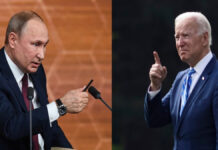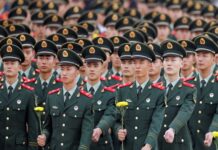 BEIJING: India and China today agreed that peace and tranquillity on the border are key for expansion of bilateral ties as their senior officials held candid talks on a border security mechanism agreement expected to be inked during Prime Minister Manmohan Singh’s proposed visit here.
BEIJING: India and China today agreed that peace and tranquillity on the border are key for expansion of bilateral ties as their senior officials held candid talks on a border security mechanism agreement expected to be inked during Prime Minister Manmohan Singh’s proposed visit here.
The fourth meeting of the Working Mechanism for Consultation and Coordination on China-India Border Affairs concluded on a positive note here, during which officials discussed the proposed Border Defence Cooperation Agreement (BDCA), aimed at more comprehensively dealing with tensions related to patrolling by both sides along the Line of Actual Control (LAC).
The mechanism headed by Foreign Ministry officials of both the countries was formed to address problems between the troops at the borders.
The two-day meeting was “held in a candid, constructive and forward looking atmosphere”, a statement issued by the Indian Embassy here said.
“Reviewing recent developments in the India-China border areas, especially in the Western Sector, the two delegations agreed that peace and tranquillity on the border is the basis for the continued expansion of India-China relations,” it said.
“To this end, both sides discussed further measures to maintain stability on the border, building on existing understandings and arrangements,” the statement said.
The talks were held against the backdrop of several incursions by Chinese troops along the LAC. The People’s Liberation Army troops had intruded into the Depsang Valley in Ladakh region several times earlier this year, which lead to diplomatic tension between the two countries.
Talks under the aegis of the border mechanism played key role in resolving the dispute under which Chinese troops withdrew from the Valley. It also paved the way for a fruitful visit by Chinese Premier Li Keqiang to India in May.
Ahead of the talks, the Chinese Foreign Ministry said the mechanism has played “positive role” in enhancing cooperation and understanding between the borders related departments and the timely treatment of sensitive issues and stabilisation of border situation.
Foreign Ministry Spokesman Hong Lei even suggested that it could be leveraged to resolve the vexed boundary dispute.
Besides the incursions, the meeting also discussed the BDCA, regarded as an upgraded version of the mechanism to comprehensively address a host of issue related to the disputed boundary issue including the patrolling of the LAC by both armies. . While officials were tight lipped about the progress of the talks over finalisation of the BDCA, expectations were high that it could be signed during Prime Minister Singh’s visit here slated for the fourth week of October.
The Indian delegation at the border mechanism talks was led by Gautam Bambawale, Joint Secretary (East Asia). It also included representatives of the ministries of Defence and Home Affairs as well as members of the Indian Army and Indo-Tibetan Border Police.
The Chinese delegation was led by Ouyang Yujing, Director General, Department of Boundary and Oceanic Affairs, Ministry of Foreign Affairs and comprised of representatives of the National Defence of the People’s Republic of China.
The Indian delegation also called on Liu Zhenmin, China’s Vice-Minister of Foreign Affairs.
Meanwhile, a number of official level talks have been held here during the past weeks as part of preparations for Singh’s visit. 2013 was regarded as landmark year in the relations between the two countries as it will be for the first time both Prime Ministers visited each other countries in the same year, stepping up high level exchanges.
While Li made New Delhi his first destination abroad after he took over as Premier to send a strong message of the importance attached by China’s new leadership to its ties with India, Singh’s visit was a reciprocal state visit which was expected to focus on a host follow-up measures to strengthen relations, including China’s promise to address over USD 30 billion trade deficit.
Also the two militaries are poised to hold their third joint military exercises in November this year at Chengdu in China after a gap of four years.-PTI






